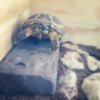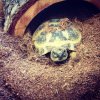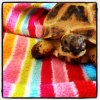https://sites.google.com/site/tortoiselibrary/species-information/russian-tortoises
I am looking for a good photo or two of a Russian to use on the care sheet in the Tortoise Library. I cannot pay, but will make sure that the photo is credited. (While I appreciate blanket 'feel free to use anything I post' comments, I would prefer that you post a good photo or a few photos and give me specific permission for them.)
I am also looking for feedback on the cares described, grammar, etc. (there or anywhere on the site!)
Right now, the Library is designed for forest tortoises, but I am hoping to broaden it to cover most pet tortoise species.
I am looking for a good photo or two of a Russian to use on the care sheet in the Tortoise Library. I cannot pay, but will make sure that the photo is credited. (While I appreciate blanket 'feel free to use anything I post' comments, I would prefer that you post a good photo or a few photos and give me specific permission for them.)
I am also looking for feedback on the cares described, grammar, etc. (there or anywhere on the site!)
Right now, the Library is designed for forest tortoises, but I am hoping to broaden it to cover most pet tortoise species.















